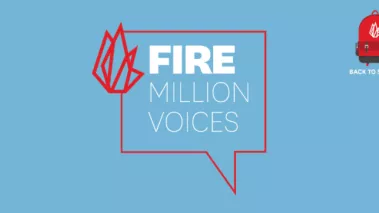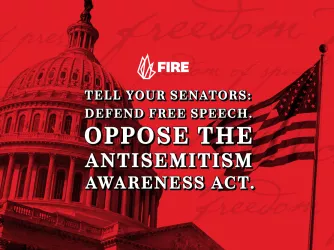Table of Contents
Back-to-School: Need FIRE’s help? Sound the FIRE Alarm!

This fall is not going to be a quiet time on college campuses. In fact, there hasn’t been a quiet time on American college campuses in several years. From 2015’s anti-racism protests at the University of Missouri that ignited an academic year of student unrest across the country, to a contentious 2016 presidential campaign year, to Trump-era protests, to tumult on campuses greeting controversial speakers, to fears of violence at demonstrations in the wake of Charlottesville, the past several years have seen free speech vigorously used and vigorously debated on campuses nationwide. And there’s no indication that will change anytime soon.
Inevitably, when facing political passion and discord on their campuses, some college administrators will be determined to suppress controversy by suppressing controversial speech, or by curtailing when and where speech can take place. All this week, we are highlighting our programs and resources — new and old — that can help students and faculty defend their right to speak out and participate in our national and local discourses without fear of punishment.
FIRE’s oldest program, our Individual Rights Defense Program, stands ready as ever to help when speech and demonstration rights are curtailed by college administrations. We defend students, faculty, and student organizations across the political and ideological spectrum, at public and private institutions. Since FIRE’s founding, IRDP has secured hundreds of victories for students and faculty who have been censored on campus through outreach, negotiation, and strategic publicity.
Likewise, FIRE’s Stand Up For Speech Litigation Project is here to continue taking campus speech codes to court, as we have since the project’s launch in July 2014. In its short history, 13 lawsuits challenging speech-restrictive policies have been filed under the SUFS umbrella. Challenging ironically-named “free speech zones,” permit requirements that prevent any spontaneous demonstration, policies that penalize controversial speech (or even just swearing while teaching), and more, SUFS lawsuits have toppled speech codes on campuses with a combined enrollment of over 250,000 students and prompted policy reforms affecting over 600,000 students.
This year, SUFS launched our Million Voices Campaign, an initiative bringing together FIRE attorneys and the dedicated members of FIRE’s Legal Network to free one million student voices from restrictive speech codes through legal action. In March, the campaign filed its inaugural lawsuit against Los Angeles Pierce College and the largest community college district in the country, challenging the quarantining of student speech to miniscule free speech zones. Pierce’s one tiny free speech zone is approximately the size of three parking spots, less than 1 percent of the campus. If successful, the suit will free the voices of approximately 150,000 students across the Los Angeles metropolitan area and get us well on the way to our Million Voices goal.
This academic year is a time to speak up and get engaged. A year ago my predecessor, Catherine Sevcenko, aptly quoted James Baldwin: “I love America more than any other country in the world, and, exactly for this reason, I insist on the right to criticize her perpetually.” Universities and colleges have a unique obligation to foster that social and political discourse. When they don’t live up to that duty, their constituents should demand it of them. As we say here: Don’t shut up. Stand up.
If your free speech rights have been violated on campus, let FIRE know.
Recent Articles
FIRE’s award-winning Newsdesk covers the free speech news you need to stay informed.

Ayaan Hirsi Ali will not submit
Podcast
Ayaan Hirsi Ali grew up in a culture of conformity. She was beaten and mutilated. She was told who she must marry. Eventually, she rebelled. "You don't speak up at first," she told us. "First you leave and you find a place of safety. It's...

FIRE statement on congressional leaders smuggling unconstitutional Antisemitism Awareness Act into a must-pass defense bill

149 days and counting! Will the White House grant a posthumous pardon in the D.M. Bennett Case? — First Amendment News 447
